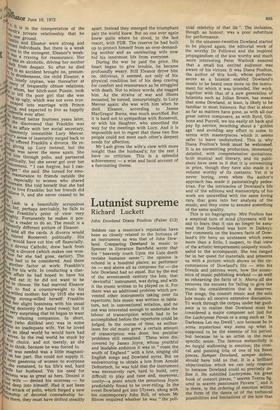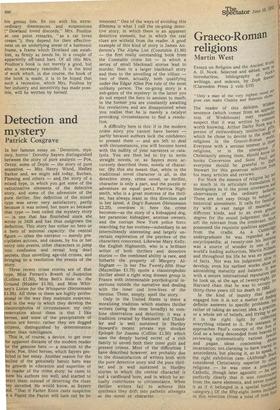Lutanist supreme
Richard Luckett
John Dowkind Diana Poulton (Faber £12) Seldom can a musician's reputation have been so closely related to the fortunes of an instrument as was that of John Dowland. Coopering Dowland in music to Spenser in literature Barnfield wrote that his "' heavenly touch Upon the Lute doeth ravishe humaine sense "; the opinion is echoed in a hundred places; as performer on — and above all as composer for — the lute Dowland had no equal. But by the end of the seventeenth century the lute, that deviceful ' instrument, was dying, and with it the music written to be played on it. For there was an additional problem which prevented other instruments taking over its repertoire; lute music was written in tablature, not in conventional notation, and no one was interested enough to undertake the labour of transcription which had to be accomplished before the repertoire could be judged. In the course of time, as enthusiasm for old music grew, a certain amount of transcription was done, but peculiar problems still remained. These were discovered by James Joyce, whose youthful and laudable ambition it was to "coast the south of England" with a lute, singing old English songs and Dowland ayres. But on endeavouring to obtain a lute from Arnold Doirnetsch, he was told that the instrument was excessively rare, hard to build, very difficult to play and tune and, moreover, costly—a point which the penurious Joyce predictably found to be aver-riding. In the event Dowland got into Ulysses, along with his contemporary John Bull, of whom Mr Bloom enquired whether he was "the poll tical celebrity of that ilk ". The inclusion, though an honour, was a poor substitute for performance.
In the nineteen-twenties Dowland started to be played again; the editorial work of the worthy Dr Fellowes and the inspired propagandism of the less worthy and much more interesting Peter Warlock ensured that a small but excited audience was aware of his virtues, It was Diana Poulton, the author of this book, whose performances as a lutanist enabled Dowland's music to be heard once more on the instrument for which it was intended. Her work, together with that of a new generation of lutanists such as Julian Bream, has meant that some Dowland, at least, is likely to be familiar to most listeners. But that is about as far as matters have gone; as with all our great native composers, as with Byrd, Gibbons and Purcell, we to-o easily sit back arid pay lip service, mouthing about a 'golden age' and avoiding any effort to come to terms with masterpieces which it seems safer to leave undisturbed. This is why Diana Poulton's book must be welcomed. It is an unremitting production, immensely detailed, with comprehensive quotations, both musical and literary, and its publishers have seen to it that it is unremitting in price, though they have also made it a volume worthy of its contents. Yet it is never boring, even when the author's approach has made it painstakingly pedestrian. For the intricacies of Dowland's life and of the editions and manuscripts of his work are unravelled with the same loving care that goes into her analysis of the music, and they come to assume something of the same quality.
This is no hagiography. Mrs Poulton has a sceptical turn of mind (Joyceans will be sad to learn that it can no longer be assumed that Dowland was born in Dalkey); her comments on the known facts of Dowland's life have an acuteness which owes more than a little, I suspect, to that view of the artistic temperament uniquely vouchsafed to the accompanist. She has ranged far in her quest for materials, and presents us with a picture which shows us the circumstances of Dowland's life — who his friends and patrons were, how the economics of music publishing worked — as well as rehearsing the facts of it. Above all she removes the excuses for failing to give the music the consideration that it deserves. The songs, the consort music and the solo lute music all receive extensive discussion. To work through the corpus under her guidance is to realize that Dowland must be considered a major composer not just for the Lachrymae Pavan or a song such as In Darkness Let me Dwell ', nor because he in some mysterious way sums up what is supposed to be the essence of his period, but because he is an artist in the most specific sense. The famous melancholy is no turgid wallowing in emotion; the ironical and punning title of one of his finest pieces, Semper Dowland, semper dolens, should have told us that. It is a brilliant objectivation which we can only respond to because Dowland could so precisely define it. He subtitled Lachrymae, his great book of consort pieces, seaven Teares figured in seaven passionate Pavans ", and it is there, in the ordering of emotion within the form of the dance or of the technical possibilities and limitations of the lute that
his genius lies. So too with his extraordinary dissonances and suspensions (" Dowland loved discords," Mrs. Poulton at one point remarks, "as a cat loves cream "); they depend for their effectiveness on an underlying sense of a harmonic frame, a frame which Dowland can establish, as firmly as needs be, in a couple of apparently off-hand bars. Of all this Mrs. Poulton's book is not merely a good, but also a necessary reminder. It is the kind Df work which, in due course, the book of the book is made; it is to be hoped that such a recension, which Mrs. Poulton by her industry and sensitivity has made possible, will be written by herself.









































 Previous page
Previous page